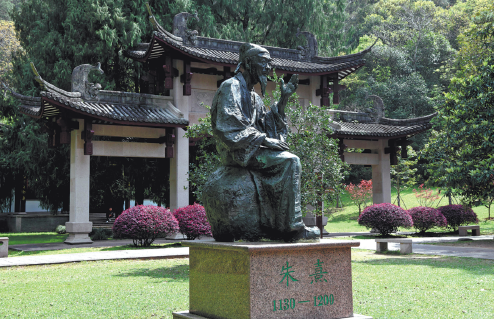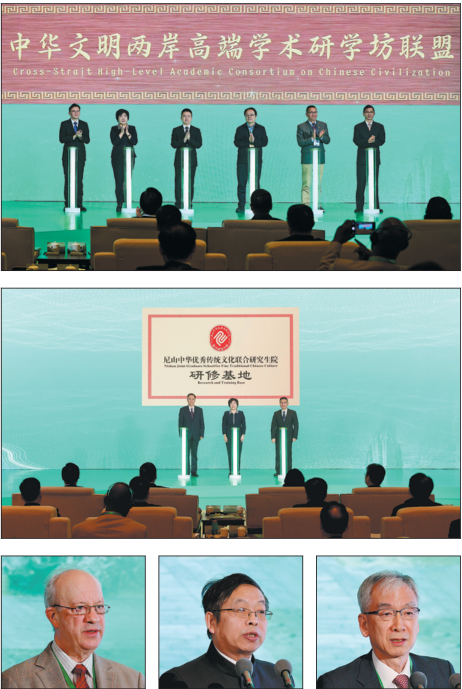Cultural products boost understanding
Video games, films and science fiction provide surprising bridges of understanding between China and the West, academics say, reports Yang Feiyue in Wuyishan, Fujian.

In a world where globalization is increasingly under threat and nationalism is on the rise, emeritus professor Robert Chard from the University of Oxford, recently offered a refreshing perspective "Cool China" to address the issue.
With decades of experience as a Sinologist, Chard, who is also a visiting professor at the Peking University's Department of History, highlights the growing disconnection between Western and Chinese cultures, while pointing to unexpected bridges — like video games, films and science fiction — that are reshaping how the world sees China.
"The (distrust) problem mostly stems from many Western countries not having enough understanding of other cultures," Chard observes.
Games like Black Myth: Wukong have introduced global audiences to Chinese stories and history, Chard says.
"I've seen their reviews. They find the game technically impressive, with engaging and captivating content. When they encounter something they don't fully understand, like who Sun Wukong is or what the story is about, they look it up online to learn more," Chard adds.
He also recalls seeing two British children play a video game set against the backdrop of the Three Kingdoms period (220-280) and thus come to know many Chinese historical figures.
"China holds a significant advantage due to its long history and incredibly rich cultural heritage. This cultural wealth has multilayered value and charm for the entire world," he says.
Chard is among more than 100 scholars who engaged in dialogue to respond to contemporary challenges at the Wuyi Forum in Wuyishan, Nanping city of Fujian province on Saturday.
It was hosted by the Renmin University of China and the Nanping government and aimed to facilitate in-depth research, promotion and interpretation of the new ideas and judgments about cultural development in the new era put forward by President Xi Jinping, especially the significance and contemporary value of the "two integrations".
In 2021, Xi proposed the concept of integrating the basic tenets of Marxism with the best of China's traditional culture. It was the first time this integration was placed on an equal footing with that of integrating Marxism's basic tenets with China's specific realities.
The emphasis on "two integrations" is understood to provide sound answers to major questions of our times.
The Wuyi Forum brought together experts to delve into the essence of the "two integrations", which represents not only a fusion of civilizational heritage with innovation but also a harmonious advancement of cultural preservation and contemporary creativity, as well as the resonance between academic inquiry and practical development, says Zhang Donggang, Party secretary of Renmin University of China.
It aims to offer a broader perspective and more innovative thinking to expound on the essence of Chinese civilization and decode its cultural genes, Zhang adds.
Qin Xuan, dean of the Academy of Xi Jinping Thought on Socialism with Chinese Characteristics for a New Era, Renmin University of China, emphasizes that the development of socialism with Chinese characteristics provides momentum, not resistance, to the world and human progress.
"Socialism with Chinese characteristics has enabled a nation comprising one-fifth of the world's population to achieve a historic journey — from standing up, to becoming prosperous, and then to growing strong. This has made a significant contribution to humanity," Qin says.
He stresses that socialism with Chinese characteristics has demonstrated the vitality of socialism to the world and expanded the pathways for developing countries to achieve modernization.
This is a path that centers on the people and prioritizes their interests. Only by adhering to a people-centered approach and fully leveraging the creative spirit of the public can modernization gain inexhaustible momentum, Qin says.
"China's development brings positive momentum to the world and the advancement of humanity," he adds.
Young-Seo Baik, emeritus professor at Yonsei University, South Korea, and an expert in East Asia and China's modern and contemporary history, highlights the enduring relevance of East Asian classical thought in addressing global challenges at the forum.
He suggests that the world should seek new paths for modern civilizational transformation from classical Chinese thought.
"To achieve the coexistence of tradition and modernity, we need to introduce the perspective of civilizational exchange," he says.
Baik points out that the Harvard professor Michael Puett's popular work The Path: What Chinese Philosophers Can Teach Us About the Good Life highlights how ancient Chinese philosophers like Confucius and Zhuangzi (Chuang-tzu) have offered practical guidance for living a good life, which focuses on honing one's instincts, training emotions, and continuously improving personal cultivation to respond morally and appropriately to various situations.
"Such responses can also have a positive impact on those around us," Baik says.
He adds that Puett's approach resonates with Western audiences by connecting ancient wisdom to modern daily life.
He proposes integrating Chinese philosophy into daily life to break rigid self-perceptions and reshape interactions between individuals and the world, and combine Neo-Confucianism with institutional innovation to explore how traditional culture can better drive reform and development.
Yang Huilin, former vice president of Renmin University of China, says that every tradition contains both "enduring ideas "and "mutable, shared elements".
"I believe there is a profound potential for dialogue between Chinese thought and Western scholars, offering a wealth of intellectual resources," Yang says.
He emphasizes that "mutual reference" and "mutual interpretation" allow civilizations to move toward and complement each other despite their differences. This approach points to a future where civilizational exchange transcends barriers, mutual learning overcomes conflicts, and inclusiveness surpasses superiority.
In dialogical research that emphasizes dialogue and interactions between different perspectives, disciplines, or cultures, Yang says that tracing and reconstructing the theoretical tools and problem sources of both Chinese and Western traditions is a fundamental task for resolving the debates between ancient and modern, East and West.
At the forum, the Cross-Strait High-Level Academic Consortium on Chinese Civilization was officially inaugurated, led by Renmin University of China and co-founded with more than 20 universities. It aims to advance Chinese cultural heritage, support the Belt and Road Initiative, and promote cross-Strait integration.
Additionally, a graduate school for fine traditional Chinese culture research and training was established to promote talent cultivation, academic research and exchanges in the fields of Chinese civilization.
Sharing his experiences with Chinese and Western students, Chard says that many Chinese students possess a far deeper understanding of Western civilization than Western students do of Chinese civilization.
To further popularize Chinese knowledge in Western societies, Chard encourages Chinese humanities scholars to take on greater responsibility.
This includes using nontraditional channels such as popular books, films and games to translate China's millennia-old wisdom and modernization stories for a global audience, while strengthening academic exchanges between China and the West.
He calls upon all Sinologists to train the next generation to bridge cultural divides.
"I hope the West can recognize that China is a very cool, fascinating, and highly worthwhile civilization to learn about," he says.


Today's Top News
- Selected works of Xi Jinping on rule of law published
- PLA issues warning to Philippines over 'joint patrols' in South China Sea
- Xi's article on developing new quality productive forces to be published
- Beijing protests new US arms sale to Taiwan
- Economic growth in 'upward momentum'
- Strong ties with Thailand stressed






























